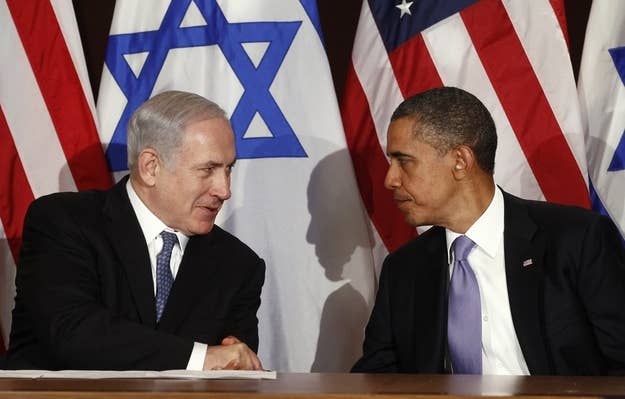
The White House is breaking with Israeli Prime Minister Benjamin Netanyahu, defending the efficacy of the administration's sanctions on Iran, saying they have punished Iran's economy.
"Sanctions are having a significant impact on Iran and its economy," said Ben Rhodes, the Deputy National Security Advisor for Strategic Communications.
But Netanyahu said on Sunday that the sanctions have not had the intended purpose of slowing Iran's nuclear program "by one iota."
"We have to be honest and say that all the sanctions and diplomacy so far have not set back the Iranian program by one iota," Netanyahu said in a meeting with presumptive Republican nominee Mitt Romney.
The remark was interpreted as a thinly-veiled attack on President Barack Obama, who has trumpeted his administration's leadership on international sanctions.
When pressed by a reporter over Netanyahu's comments, Rhodes said the sanctions are changing the calculus for Iranian leaders in determining whether to continue with their nuclear program.
"We do see the sanctions having an effect in terms of sharpening the choice for the Iranian government," he said.
Rhodes said specifically that the sanctions are slowing the nuclear program — by tightening Iran's cash flow, making it difficult for the country to procure needed material and making the choice to divert resources to it all the more painful. But Rhodes was clear that the White House agrees with Netanyahu that sanctions have not yet changed Iran’s decision making.
Today the White House announced new sanctions on Iran and banks that have provided financial services to Iran relating to terrorism or its nuclear program.
Rhodes cited Iranian President Mahmoud Ahmadinejad to prove that the sanctions are working. A White House fact sheet announcing the new sanctions also quoted a former Iranian official saying the sanctions are slowing the nuclear program.
U.N. Ambassador Susan Rice also defended the sanctions in an interview with BuzzFeed, saying:
What the Prime Minister of Israel was saying was that to date, they still have a nuclear program. And obviously, that's a fact. And one that we share grave concern about. But our view is that by continuing to ramp up the economic pressure, and making the sanctions more and more forceful, which the Israeli government joins us in wanting to see done and which we are doing progressively every day over time, that the combination of those pressures and sanctions may ultimately cause Iran to change its calculation and decide it's too costly to pursue its nuclear program. We have always taken the view that the combination of sanctions and the opportunity for diplomacy can still potentially yield the result that President Obama is so formally committed to, which is preventing Iran from acquiring nuclear weapons. But he's also been very plain in stating that he takes no options off the table and that we'll do what's necessary to prevent Iran from having nuclear weapons.
Rhodes also took a shot at Mitt Romney, saying he had yet to see any policy comments from him that would break from the administration's policies, noting that the White House has "thrown the book at" the Iranians.
"I have yet to see anything that differs from the approach that we’ve taken in applying pressure on the Iranian government," he said.
Meanwhile, Majority Leader Harry Reid Tuesday said he expects Congress to wrap up work on a new set of sanctions against Iran before lawmakers leave for the August recess on Friday.
"I think we can get this done," Reid told reporters of the bill, which has slowly been working its way through both chambers on a bipartisan basis.

